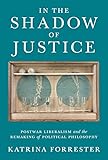In the shadow of justice : Postwar liberalism and the remaking of political philosophy / Kartrina Forrester.
Publisher: Princeton, NJ : Princeton University Press, 2019Edition: 1st editionDescription: pages cmContent type:- text
- unmediated
- volume
- 9780691163086 (cloth : alk. paper)
- 320.54 FOR
| Item type | Current library | Call number | Status | Date due | Barcode |
|---|---|---|---|---|---|
 BOOKs
BOOKs
|
National Law School | 320.54 FOR (Browse shelf(Opens below)) | Available | 37862 |
About this Item: Princeton University Press, United States, 2019. Hardback. Condition: New. Language: English. Brand new Book. "A forceful, encyclopedic study."-Michael Eric Dyson, New York Times A history of how political philosophy was recast by the rise of postwar liberalism and irrevocably changed by John Rawls's A Theory of JusticeIn the Shadow of Justice tells the story of how liberal political philosophy was transformed in the second half of the twentieth century under the influence of John Rawls. In this first-ever history of contemporary liberal theory, Katrina Forrester shows how liberal egalitarianism-a set of ideas about justice, equality, obligation, and the state-became dominant, and traces its emergence from the political and ideological context of the postwar United States and Britain.In the aftermath of the civil rights movement and the Vietnam War, Rawls's A Theory of Justice made a particular kind of liberalism essential to political philosophy. Using archival sources, Forrester explores the ascent and legacy of this form of liberalism by examining its origins in midcentury debates among American antistatists and British egalitarians. She traces the roots of contemporary theories of justice and inequality, civil disobedience, just war, global and intergenerational justice, and population ethics in the 1960s and '70s and beyond. In these years, political philosophers extended, developed, and reshaped this liberalism as they responded to challenges and alternatives on the left and right-from the New International Economic Order to the rise of the New Right. These thinkers remade political philosophy in ways that influenced not only their own trajectory but also that of their critics.Recasting the history of late twentieth-century political thought and providing novel interpretations and fresh perspectives on major political philosophers, In the Shadow of Justice offers a rigorous look at liberalism's ambitions and limits.

There are no comments on this title.